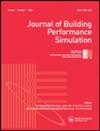Rule reduction for control of a building cooling system using explainable AI
IF 2.3
4区 工程技术
Q2 CONSTRUCTION & BUILDING TECHNOLOGY
引用次数: 2
Abstract
Although it is widely acknowledged that reinforcement learning (RL) can be beneficial for building control, many RL-based control actions remain unexplainable in the daily practice of facility managers. This paper reports a rule reduction framework using explainable RL to enhance the practicality of the control strategy. First, deep Q-learning was applied to explore the optimal control strategies of a parallel cooling system (ice-based thermal system + geothermal heat pump system) of an existing office building. A set of modularized and interconnected data-driven models was developed using ANNs for pretraining an artificial agent. After exploring the control strategies, the decision-making rules of the agent were reduced using a decision tree. The performance of the reduced-order rule-based control proved comparable to the complex and uninterpretable control strategy of deep Q-learning. The difference in energy savings between the two is marginal at 1.2%.使用可解释的人工智能控制建筑物冷却系统的规则缩减
尽管人们普遍认为强化学习(RL)对建筑控制有益,但在设施管理人员的日常实践中,许多基于强化学习的控制行为仍然无法解释。本文报告了一个使用可解释强化学习的规则约简框架,以提高控制策略的实用性。首先,应用深度q -学习方法对既有办公大楼冰基制冷+地热热泵并联制冷系统的最优控制策略进行了探索。利用人工神经网络建立了一套模块化、互联的数据驱动模型,对人工智能体进行预训练。在探索控制策略的基础上,利用决策树对智能体的决策规则进行约简。基于规则的降阶控制的性能可与深度q学习的复杂且不可解释的控制策略相媲美。两者在节能方面的差异仅为1.2%。
本文章由计算机程序翻译,如有差异,请以英文原文为准。
求助全文
约1分钟内获得全文
求助全文
来源期刊

Journal of Building Performance Simulation
CONSTRUCTION & BUILDING TECHNOLOGY-
CiteScore
5.50
自引率
12.00%
发文量
55
审稿时长
12 months
期刊介绍:
The Journal of Building Performance Simulation (JBPS) aims to make a substantial and lasting contribution to the international building community by supporting our authors and the high-quality, original research they submit. The journal also offers a forum for original review papers and researched case studies
We welcome building performance simulation contributions that explore the following topics related to buildings and communities:
-Theoretical aspects related to modelling and simulating the physical processes (thermal, air flow, moisture, lighting, acoustics).
-Theoretical aspects related to modelling and simulating conventional and innovative energy conversion, storage, distribution, and control systems.
-Theoretical aspects related to occupants, weather data, and other boundary conditions.
-Methods and algorithms for optimizing the performance of buildings and communities and the systems which service them, including interaction with the electrical grid.
-Uncertainty, sensitivity analysis, and calibration.
-Methods and algorithms for validating models and for verifying solution methods and tools.
-Development and validation of controls-oriented models that are appropriate for model predictive control and/or automated fault detection and diagnostics.
-Techniques for educating and training tool users.
-Software development techniques and interoperability issues with direct applicability to building performance simulation.
-Case studies involving the application of building performance simulation for any stage of the design, construction, commissioning, operation, or management of buildings and the systems which service them are welcomed if they include validation or aspects that make a novel contribution to the knowledge base.
 求助内容:
求助内容: 应助结果提醒方式:
应助结果提醒方式:


